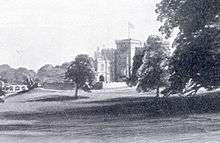Bryan Cooper (politician)
| Bryan Cooper | |
|---|---|
| Teachta Dála | |
|
In office August 1923 – July 1930 | |
| Constituency | Dublin County |
| Member of Parliament | |
|
In office January 1910 – December 1910 | |
| Constituency | South Dublin |
| Personal details | |
| Born |
17 June 1884 Simla, India |
| Died |
5 July 1930 (aged 46) County Sligo, Ireland |
| Nationality | Irish |
| Political party |
Irish Unionist Alliance Independent Cumann na nGaedheal |
| Spouse(s) | 1. 1910 Marion Dorothy Handcock, divorced 1920; 2.1925 Lillian Stella Hewson |
Bryan Ricco Cooper (17 June 1884 – 5 July 1930) was an Irish politician, writer and landowner from Markree Castle, County Sligo. He was prominent in Dáil Éireann in the early years of the Irish Free State, having previously served as MP to Westminster for South Dublin County (1910), a seat he subsequently represented in the Dáil from 1923 to 1930.
Life
The Cooper family, Protestant landlords, had been involved in politics in Sligo since long before the 1800 Act of Union (which Joshua Cooper, a Privy Councillor at the time, strongly opposed).[1] Bryan Cooper's father, Francis, was a major in the British Army stationed at Simla, India, where Bryan was born. His mother was the daughter of another Irishman serving in India, Major-General Maunsel Prendergast, who had married a Swiss woman there. The family returned to Ireland before Bryan was a year old, and then spent several years in postings around Britain, until his father was sent to South Africa at the start of the Second Boer War. Bryan was educated (but not particularly happy) at Eton College. In 1900, his father died during the war of typhoid fever and Bryan inherited Markree from his grandfather Edward Henry Cooper.
Cooper joined the British Army and, following his father's advice, trained as a gunner at the Royal Military Academy, Woolwich (1902–03). A fellow-cadet ("R. T. H.") described him as "cheerful, well-mannered and pleasant", but more interested in books than in military matters.[2] He resigned his commission a few years later and returned to Ireland, intending to enter politics – he once said that he entered politics to cure him of his shyness. In his spare time he wrote poetry strongly influenced by Celtic imagery and W. B. Yeats (whom he was later to befriend), and started work on a novel.
In 1908 he was appointed High Sheriff of Sligo.[3] In January 1910 he was elected Unionist MP for South Dublin, defeating his nearest opponent by only sixty-six votes. During his election campaign he got to know a young lady of Irish ancestry from Fulmer, Buckinghamshire, a Miss Handcock, whom he married shortly afterwards. They were to have a daughter and three sons. He lost his seat at the December election later that year. Aged only 26, he was one of the youngest ever MPs to leave the House of Commons. He resigned his commission as a captain in the Reserves in May 1914, stating publicly that he had done so in sympathy with the officers in the Curragh, but he wrote in his private diary (Uncensored Memoirs) that he had for years been fed up of the regime in the Reserves, and had been intending to quit. After the start of World War I he joined the Fifth (Service) Battalion of the Connaught Rangers. He saw action in Gallipoli, Thessalonika and Stavros. After the war he became Press Censor in Ireland and wrote Ireland Under Sinn Féin. He got to know many writers and intellectuals active in Dublin at the time.[4]

Major Cooper was first elected to Dáil Éireann at the 1923 general election as an independent Teachta Dála (TD) for the Dublin County constituency.[5] W. B. Yeats was one of his chief supporters (of whom Cooper wrote: "since I was a boy his writings have been one of the strongest influences on me, and helped to make me the good Irishman I hope I am.").[6] He was re-elected at the June 1927 general election. He joined the Cumann na nGaedheal party. Other former independents who joined "Mr Cosgrave's ranks" included Labour independent John Daly and Vincent Rice, formerly National League.[7] He was elected as a Cumann na nGaedheal TD at the September 1927 general election.[8] He died in July 1930 and the subsequent by-election on 9 December 1930 was won by Thomas Finlay of Cumann na nGaedheal. He was one of the few people who served in the House of Commons and in the Oireachtas.
In 1931, his widow presented a half size reproduction of the ancient Lough Lene bell to Dáil Éireann and it has since been the bell of the Ceann Comhairle of Dáil Éireann.[9]
See also
References
- ↑ Robinson, p. 21
- ↑ Robinson, p. 49
- ↑ Burke's Irish Family Records (London, U.K.: Burkes Peerage Ltd, 1976). p. 274.
- ↑ Robinson, pp. 117–133
- ↑ "Mr. Bryan Cooper". Oireachtas Members Database. Retrieved 27 November 2008.
- ↑ Robinson, p. 48
- ↑ The Times, Mr. Cosgrave and the Oath, 30 August 1927
- ↑ "Bryan Cooper". ElectionsIreland.org. Retrieved 27 November 2008.
- ↑ "Leinster House: A Tour and History – Tithe an Oireachtais". Houses of the Oireachtas. Retrieved 19 July 2008.
Sources
- Robinson, Lennox (1931). Bryan Cooper. London: Constable & Co.
External links
- Hansard 1803–2005: contributions in Parliament by Bryan Cooper
| Parliament of the United Kingdom | ||
|---|---|---|
| Preceded by Walter Hume Long |
Member of Parliament for South County Dublin January 1910–December 1910 |
Succeeded by William Francis Cotton |